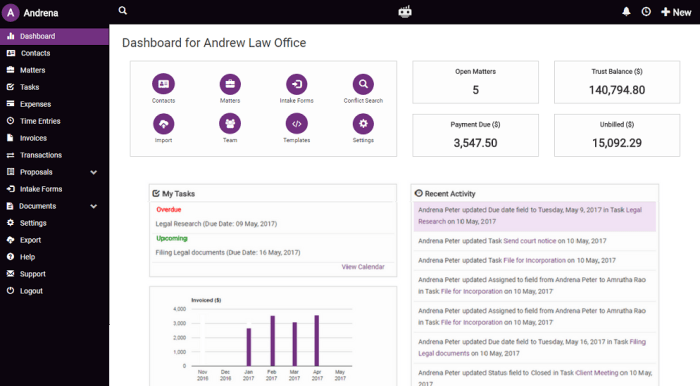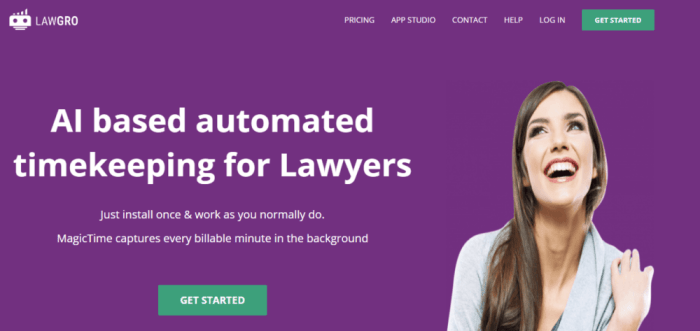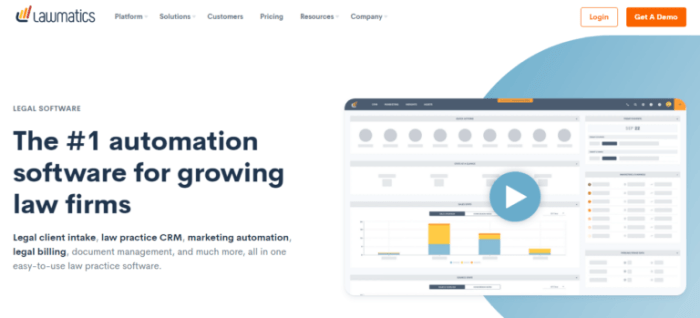Choosing the right Customer Relationship Management (CRM) software is crucial for law firms of all sizes. A robust legal CRM streamlines operations, improves client communication, and ultimately boosts profitability. This comprehensive guide explores the best legal CRM software options available, considering features, pricing, and suitability for different firm structures. We’ll delve into key functionalities, helping you make an informed decision for your practice.
Key Features of Top Legal CRM Software
Before diving into specific software, let’s Artikel the essential features you should look for in a legal CRM:

Source: thelegalpractice.com
Essential Features:, Best legal crm software
- Contact Management: Centralized database for client and contact information, including detailed case histories, communication logs, and important documents.
- Matter Management: Efficiently track cases, deadlines, and tasks, ensuring no detail is overlooked. This often includes features like automated reminders and progress tracking.
- Document Management: Secure storage and easy access to all case-related documents, simplifying document retrieval and collaboration.
- Time Tracking & Billing: Accurate time recording, streamlined invoicing, and reporting capabilities to manage billable hours and optimize profitability. Integration with accounting software is a significant advantage.
- Communication Tools: Integrated email, calendaring, and potentially even video conferencing capabilities for seamless client interaction.
- Reporting & Analytics: Detailed reports on case progress, client interactions, and financial performance, enabling data-driven decision-making.
- Security & Compliance: Robust security measures to protect sensitive client data, adhering to legal and ethical standards (e.g., GDPR, HIPAA).
- Integration Capabilities: Seamless integration with other essential software used in your law firm, such as accounting software, e-signature tools, and document automation platforms.
- Mobile Accessibility: Access to the CRM from any device (desktop, tablet, smartphone) for on-the-go management.
- Workflow Automation: Automating repetitive tasks like email reminders, document generation, and appointment scheduling, freeing up valuable time for lawyers and staff.
Top Legal CRM Software Options
The market offers a variety of legal CRM software solutions. Here are some of the leading contenders, categorized for clarity:
High-End Legal CRM Solutions (Often with Enterprise Features):
- Clio Manage: A popular choice known for its comprehensive features, robust security, and excellent customer support. It excels in matter management, time tracking, and client communication. [Source: clio.com ]
- MyCase: Another strong contender, MyCase provides a user-friendly interface and a comprehensive suite of features suitable for solo practitioners and larger firms. Its strong reporting capabilities are a key benefit. [Source: mycase.com ]
- PracticePanther: A feature-rich option offering a good balance of functionality and affordability. It emphasizes ease of use and strong integration capabilities. [Source: practicepanther.com ]
Mid-Range Legal CRM Solutions (Good Balance of Features and Price):
- CaseFox: A versatile option offering a good range of features at a competitive price point. It’s often a good fit for firms looking for a scalable solution as they grow. [Source: (Find a reliable CaseFox website link here if available)]
- CosmoLex: Known for its strong time tracking and billing features, CosmoLex is a solid choice for firms that prioritize efficient financial management. [Source: (Find a reliable CosmoLex website link here if available)]
Budget-Friendly Legal CRM Solutions (Ideal for Solo Practitioners or Small Firms):
- Freshworks CRM (with customizations): While not specifically designed for legal practices, Freshworks CRM’s flexibility allows for customization to meet the needs of smaller firms. Its affordability is a major draw. [Source: freshworks.com/crm ]
- Zoho CRM (with customizations): Similar to Freshworks, Zoho CRM offers a cost-effective solution that can be adapted for legal use with careful configuration. [Source: zoho.com/crm ]
Choosing the Right Legal CRM: Factors to Consider: Best Legal Crm Software
Selecting the best legal CRM depends on your firm’s specific needs and circumstances. Here are key factors to consider:

Source: webfx.com
- Firm Size and Structure: A solo practitioner’s needs will differ significantly from those of a large law firm. Consider scalability and the number of users.
- Budget: Legal CRM software pricing varies considerably. Determine your budget before evaluating options.
- Required Features: Prioritize the features most critical to your firm’s operations. Don’t overspend on features you won’t use.
- Integration with Existing Systems: Ensure the CRM integrates seamlessly with your accounting software, document management systems, and other essential tools.
- User-Friendliness: Choose software with an intuitive interface that your team can easily learn and use.
- Customer Support: Reliable customer support is essential, especially when dealing with technical issues or needing assistance with setup and training.
- Security and Compliance: Verify that the software meets all necessary security and compliance standards to protect sensitive client data.
Frequently Asked Questions (FAQ)
- Q: What is the average cost of legal CRM software? A: Pricing varies widely, from a few hundred dollars per year for basic plans to several thousand dollars per year for enterprise-level solutions with many users and advanced features.
- Q: Can I integrate my existing accounting software with a legal CRM? A: Many legal CRMs offer integration with popular accounting software packages. Check the software’s specifications to ensure compatibility.
- Q: How long does it take to implement a legal CRM? A: Implementation time varies depending on the complexity of the software and your firm’s size. Expect a period of setup, data migration, and training.
- Q: What are the benefits of using a legal CRM? A: Benefits include improved client communication, enhanced case management, increased efficiency, better time tracking and billing, and data-driven decision-making.
- Q: Is cloud-based legal CRM software secure? A: Reputable cloud-based CRM providers invest heavily in security measures to protect client data. Look for providers with robust security certifications and compliance with relevant regulations.
Conclusion
Selecting the best legal CRM software is a significant decision that can significantly impact your firm’s efficiency and profitability. By carefully considering the factors Artikeld above and exploring the various options available, you can find the perfect solution to streamline your operations and enhance your client relationships. Remember to take advantage of free trials or demos offered by many providers to test the software before committing to a purchase.
Call to Action
Ready to transform your law firm’s efficiency? Explore the options discussed above and choose the legal CRM that best suits your needs. Start your free trial today and experience the benefits firsthand!
Frequently Asked Questions
What is the average cost of legal CRM software?
Pricing varies greatly depending on features, vendor, and the number of users. Expect to find options ranging from affordable monthly subscriptions to more substantial enterprise solutions.
How can I integrate my existing legal software with a CRM?

Source: webfx.com
Many legal CRMs offer integrations with popular legal software applications. Check the software’s specifications for compatibility with your current systems. Some may require custom integrations.
What security measures should I look for in legal CRM software?
Prioritize software with robust security features such as data encryption, access controls, and compliance with relevant data privacy regulations (e.g., GDPR, HIPAA).
Is cloud-based legal CRM software more secure than on-premise solutions?
Both options offer varying levels of security. Cloud-based solutions often benefit from the vendor’s investment in security infrastructure, while on-premise solutions provide greater control over data but require dedicated IT resources.
